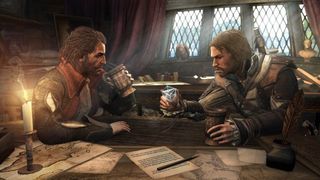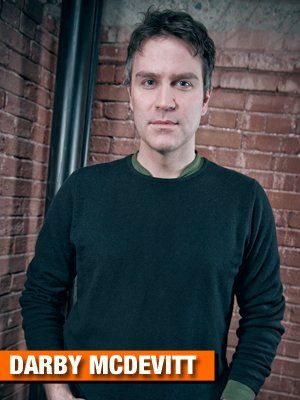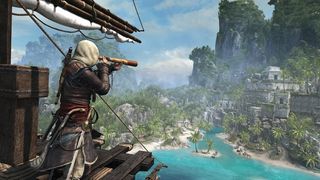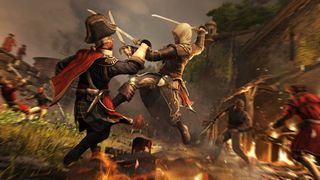Assassin’s Creed is in transition. While the overarching story of Desmond, the weird glowing people, and the imminent flaming death of all man-kind has been largely tied up, the series is still focusing on the Kenway family and the dents it made during some of history’s most turbulent times. Black Flag feels like a bridge between two chapters of the Assassin’s Creed franchise (which neatly spans the gap between two console generations too). It’s a bridge with pirates. And swag. And parrots. Our favourite kind of bridge.
So, we sat down with Darby McDevitt, lead writer on AC Black Flag, and Corey May, lead writer on Assassin's Creed 3 to find out how the two games are connected, and to reflect on the past, present and future of Assassin’s Creed.

One theme that has defined the AC series since day one has been history. The first question everyone asks when a new game is announced is ‘when or where is it set?’ Black Flag is set before the events of Assassin’s Creed 3, and follows the exploits of Haytham Kenway’s father, Edward, who is a pirate. One of the first things you notice about Black Flag is the way it packs a lot of action (both outright and stealth) into everything you do. There’s never a dull moment. So, we wondered, does this mean there’s less of an emphasis on historical accuracy? Is Assassin’s Creed letting its virtual hair down?

“No, there isn’t less of an emphasis,” explains Darby McDevitt. “It’s more to do with the fact that, during the early stages of development, we do a tremendous amount of historical research and then we have to decide how much of that is really a benefit to gameplay, and how much is ‘detrimental’. Sometimes, if you adhere too closely to historical accuracy, then that can confuse the gameplay. One example is that historically, pirates didn’t get into that many fights. They tended to just intimidate people into giving up their gold and cargo. We tested an early idea about how you might intimidate people into submission--as opposed to fighting them--but we found it very difficult to implement. We’ve also included a much higher incidence of getting into conflicts than you would have found during the golden age of piracy. Historical accuracy is still the foundation on which we built our game.”
"No-one knows who fired the shot that started the American Revolution. That worked to our advantage on Assassin's Creed 3"
“Hopefully it’ll inspire players to go out there and learn more about these things,” adds Corey May. “There’s this Facebook group out there called ‘Everything I learned about History, I learned from Assassin’s Creed’. It’s cute, but it’s also a little terrifying. History shapes and inspires our games, but they’re not meant to be interactive documentaries. Sure, we don’t want to play too fast and loose with history, which is why you didn’t see George Washington eating babies and riding on a Pegasus in AC3 or anything like that. As fun as that might be, there are certain things that we could never do. It’s a collaboration between fiction and history.”

May adds: “We have the added advantage that some of the periods that we cover have plenty of grey areas, so for example--when we were making Assassin’s Creed 3--no-one really knows who fired the ‘shot heard around the world’, the shot that started the American Revolution. So we were able to play with that, and we included a scene where people were arguing about whether it was the loyalists or the revolutionaries, and who was able to take advantage of it. Back then the revolutionaries didn’t want anyone to think they’d fired the first shot because they didn’t want to be tried for treason if the revolution failed--they could just claim they were acting in self-defence. Sometimes history is uncertain, and that really works to our advantage.”

Assassin’s Creed always gives the impression that the player, via their on-screen character, is altering the course of history themselves. (Well, altering history through Desmond, who was plugged into the Animus. It's all very meta.) The series has had a number of protagonists, who--love or hate them--have all been very distinct characters. Many complain that Connor is dull next to the likes of Ezio and Haytham, a criticism we put to Corey May. “The thing that was most fun about Haytham, was how different he is to Connor. It was exciting to write two completely different characters. I suppose it’s easier to write someone like Haytham, because he’s having such a great time with whatever he’s doing. It’s always done with a bit of a smile and flair. Connor was a lot more introspective and thoughtful, not prone to those kinds of fancy displays. That restraint was a challenge.”
"I wanted the Kenways to be seen as a family, despite the fact they never grew up together"
Given that Black Flag deals with Edward Kenway--Connor’s grandfather--there are strong story links between the two games, and a fair few Easter Eggs to find. “I managed to get hold of drafts of Corey’s script for AC3, and played early versions of the game while I was writing Edward,” explains McDevitt. “I wanted these guys to be seen as a family, despite the fact that they never grow up together. Edward has left home by the time Haytham is ten years old, so they grow up separately, but I thought it’d be fun to present them as a triangle of personalities. So, while Edward has a bit of Connor’s sentimentality and a decent heart, he also has a lot of Haytham’s brashness.”

The writers are keen to avoid spoilers, but do confirm that there will be plenty of interaction between Assassin’s Creed 3 and Black Flag. “We definitely make some links, but I won’t go too far into the connection,” says May. “There is a throw-away line in AC3 that is referenced in Black Flag, and it’s a really cool thing for those who paid attention during Assassin’s 3. These characters all inhabit the same world, and there is great continuity.”

